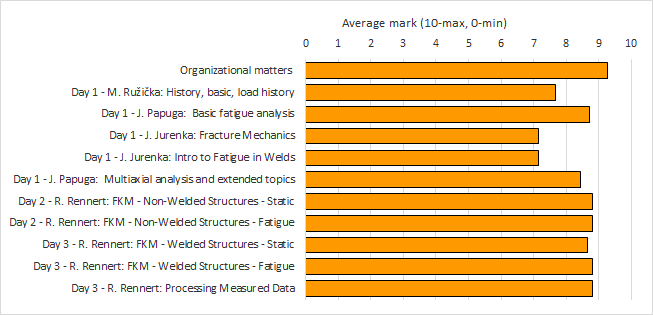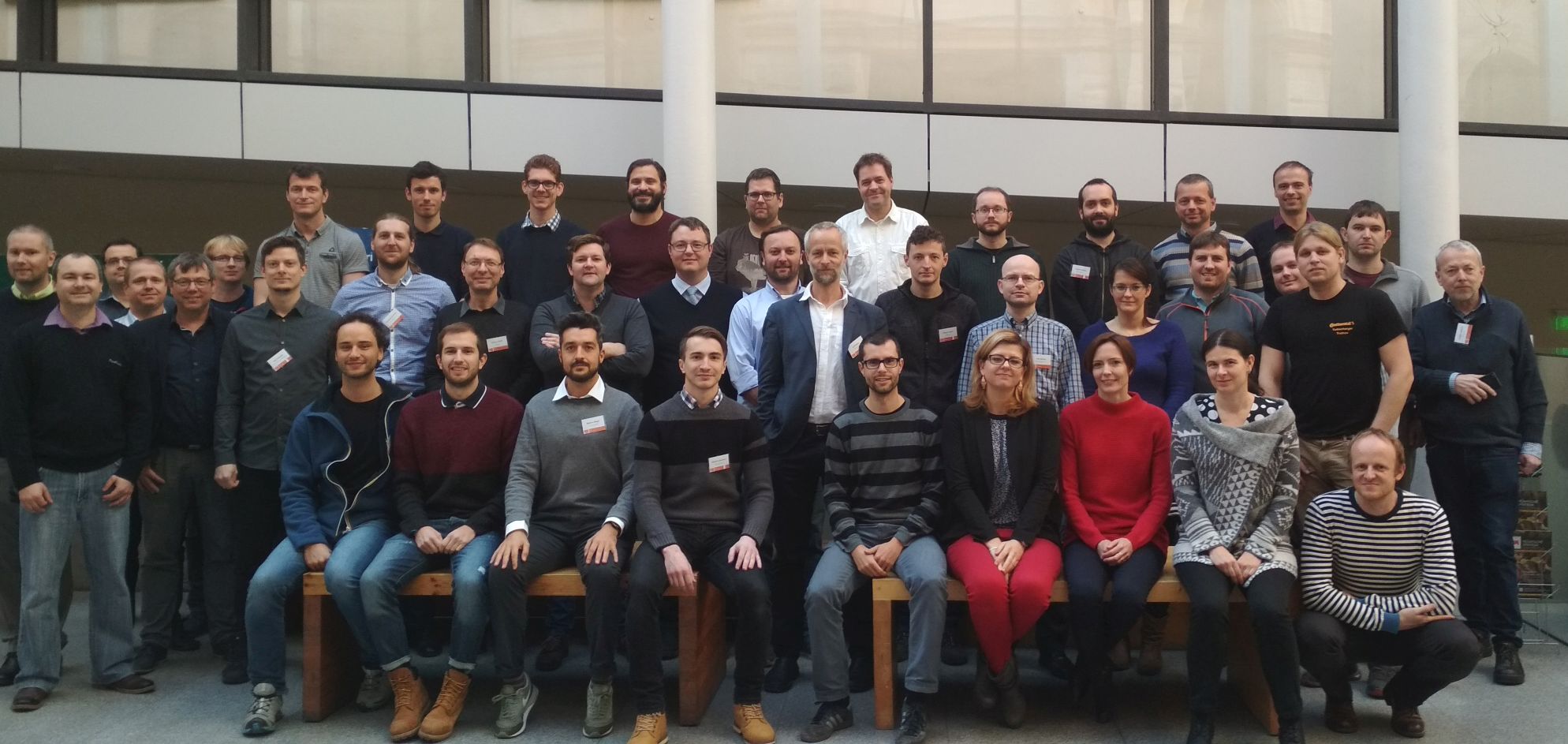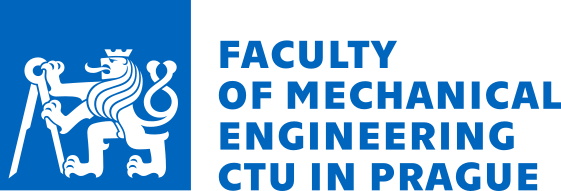User: unknown || Login || NEWS: WCFA2019, Photo, Evaluation, Files to download, Registration closed, Schedule, GDPR issue
WCFA'18-FKM
Evaluation of the Workshop
In order to get some feedback from the participants about the meeting and the lectures, we asked them to fill our questionnaires anonymously. They could select values in between the 1 (awful) to 10 (magnificient). The number of participants coming for the first day (37) was substantially lower than the number attending the other two days (55 at the peak) lectured solely by Roland Rennert. The overall statistic evaluations is provided here:

The more detailed evaluation in individual evaluated sections can be analyzed here below. Note that the fonts in italics are comments of me (Jan Papuga) as the manager of the conference.
| Values stated: Average mark/Number of evaluations | ||||||
|---|---|---|---|---|---|---|
| Day | Lecturer: Lecture | Slides | Show | Comprehensibility | Gained knowledge | Importance of the topic |
| 1 | M. Růžička: History, Basics, Load History | 8.6/28 | 7.8/27 | 7.7/28 | 6.8/26 | 7.5/26 |
| Comments: | very good (2x); fine for introduction to the topic; repeated knowledge, but it is good to repeat sometimes; too general, therefore zero importance | |||||
| J. Papuga: Basic Fatigue Analysis | 9.1/28 | 9.0/28 | 8.8/28 | 7.9/28 | 8.8/28 | |
| Comments: | really good speech, easy to understand with complex overview of the topic; almost great, great English; great elocution (wow, new word for me), perfect, great explanation (thanks) | |||||
| J. Jurenka: Fracture Mechanics | 8.3/28 | 7.0/27 | 6.8/27 | 6.5/28 | 7.1/28 | |
| Comments: | good response to questions but weak presentation and comprehensibility; poor, confusing; important | |||||
| J. Jurenka: Intro to Fatigue in Welds | 8.2/28 | 7.0/27 | 6.9/27 | 6.4/28 | 7.4/28 | |
| Comments: | good response to questions but weak presentation and comprehensibility; poor, confusing; sometimes I was lost in the presentation | |||||
| J. Papuga: Multiaxial Fatigue and Extended Topics | 9.1/28 | 8.8/28 | 8.3/28 | 7.9/28 | 8.2/28 | |
| Comments: | again very good speech, but a bit more complicated topic to understand, not so easy to explain; lot of formulas (I wonder how you could learn about multiaxial fatigue without any formula... I'll keep it in my mind) | |||||
| 2 | R.Rennert: FKM - Non-Welded Structures - Static Analysis | 9.1/44 | 9.1/44 | 9.1/44 | 8.3/44 | 8.5/44 |
| Comments: | great comprehensive explanation (3x); very nice understandable English :-); I need to study it later; | |||||
| R.Rennert: FKM - Non-Welded Structures - Fatigue Analysis | 9.0/44 | 9.0/44 | 8.8/44 | 8.2/44 | 9.0/44 | |
| Comments: | lot of formulas; he always went to the depts of the topic :-); too many new things for me (Well, this was the original intention of the workshop) | |||||
| 3 | R.Rennert: FKM - Welded Structures - Static Analysis | 8.9/39 | 9.1/39 | 8.9/39 | 8.2/39 | 8.3/39 |
| Comments: | Not very comprehensive for a complete beginner | |||||
| R.Rennert: FKM - Welded Structures - Fatigue Analysis | 9.0/39 | 9.1/39 | 8.9/39 | 8.3/39 | 8.7/39 | |
| Comments: | Not very comprehensive for a complete beginner | |||||
| R.Rennert: FKM - Processing Measured Data | 9.0/39 | 9.0/38 | 9.0/39 | 8.6/39 | 8.6/39 | |
| Comments: | ||||||
| Comments overall: | Thanks a lot for a great workshop (2x) In general the course was very good Pay more attention to fracture mechanics with FEA (examples) Day 1: Perfect course - too much information, maybe more time for lecturing (It is true, that we can't get into the limit with the intro to fatigue, we will think about that. But the intention was to serve just as a preludium for the FKM course) Very useful training days!! Please print the lectures in colour, I can't distinguish the lines in graphs (2x)(DIY: Do It Yourself. The course is already quite expensive and I do not want to get into the unsafe situation to make it even more expensive due to the colour print. Fatigue Analysis RI didn't gave you just the white pen in our bag, but also coloured pencils and the sharpener. I myself used it all the time, and it really works :-) ) One of the best training that I have ever participated! Thanks! I would appreciate more practical info/tips for real projects. Some approaches not easily applicable for large assemblies with lots of welds Very useful and helpful | |||||
| Next recommended topics: |
Rules on FE-analysis for fatigue assessment, best practice techniques, correct meshing and its validation in FEA models (4x) FE-modelling and fatigue in plastics and composite materials (3x), above all composite reinforced by glass fibers Low-cycle fatigue (2x) Practical examples over different methods of fatigue life estimation Fatigue as a weak chain, sensitivity of each chain link on final results (Did you note the FKM approach to summarize all potential errors into one safety coefficient? It's a normal human response to simplify the things. We at the CTU are focusing individual bricks in the fatigue life prediction, but the funding is just for student work, and no substantial research... I guess this is the same everywhere, these issues are assumed to be already fixed. My conclusion - you are asking us to do a research, instead of lecturing, and then we should present the result to public. Tell it to the Czech Science Foundation - just yesterday I've got the information, that my next 3-years project in that topic would not be financed.) Sharp notches in non-welded parts (radius less than 0.5mm, or non-defined in drawing - related to the machining tool) High mean stresses (tensile, compressive) in the Haigh diagram - experiments, theory, S-N curves specifics, design criteria, mid- and high-cycle fatigue FEM modelling and design in near-contact areas (roller bearings, notch effect caused by assembling) Assessment of spot welds, laser welds (automotive) Thickness factor for t>+-5mm - influence of lower thicknesses (1-2mm, stamped metal sheets) Notch approximation methods Fatigue assessment according to Eurocode FKM-Fracture Mechanics Proof of Strength for Engineering Components Vibrations Well in overall: I thought you would write not just research hints, but the main topic for one-three day course. In that way I see here the general interest in low-cycle fatigue (the idea of decrease the allowable stress to 0.75Rp used in FKM didn't seem to be appealing to some of you), in fatigue in plastics/composites and in FE-modelling rules (I wonder if I'd be able to find somebody unbiased for the use of a particular fatigue solver for that.). I will not organize next vibration fatigue course at least for next two years, it was here in 2016, and I am not sure I would find enough participants. I have already thought about extending this FKM course to include also cracks, and asked Mr Rennert about the contact, but then I found that we would get to 5 days of lecturing. My former boss in Evektor used to tell me, that already 3 days are too long to let the people go... | |||||
The meeting itself was rated separately, and the results are provided here:
| Values stated: Average mark/Number of evaluations | ||||
|---|---|---|---|---|
| Information before meeting | Realization on-site, location | Room, equipment | Meals | |
| 8.8/44 | 9.7/46 | 9.1/47 | 9.3/47 | |
| Comments to "Information before meeting": | The webpages were very confusing Starting time of lectures was not on website/I did not find it (2x). It would be useful to mention the starting time for next year. Online map very good. I can't give full score, because I haven't searched for detailed information! I can't judge... (Well, why you then rate it 7, and worsen the output?) Communication problems caused probably due to GDPR (2x) | |||
| Answer to "Information before meeting": | I made some notes, which part of the website should be changed till the next volume. Anyway, the complete program was published on October 3, and the information about it got even into the header line of HOT NEWS on the top of the website. I don't understand, that you do not note that. Not good enough was informing you through the mailing campaign, but really it is much more complicated thanks to GDPR. At least one more e-mail before the onset would be appropriate. There will be a clear schedule sent to you next time before the start of the workshop... | |||
| Comments to "Realization on-site, location": | Very nice room in a nice building, good place with simple transfer from everywhere Location is perfect (2x) | |||
| Answer to "Realization on-site, location": | Thanks! | |||
| Comments to "Room, equipment": | bad laser pointer; screen too high; short tables, sitting is not comfortable (4x); colored presentation next time; short tables; uncomfortable chairs; loud door 1-Praha Hard to understand, mark 1 would be the worst rating... Does it mean that Prague is fine? | |||
| Answer to "Room, equipment": | Originally, we wanted to give you a special present - a cushion to sit on it, because this commentary is here for the third year. But then my wife told me that we'd be there on cushions like a gang of pensioners; and the cushion specimen I saw in a photo didn't look nice. Maybe next year? | |||
| Comments to "Meals": | perfect servis, regular breaks for coffee to gain energy for next presentations; very good; really satisfied; perfect; we are born in the food valley :-) (Parma, Italy) (rated this item just by 6 - next time I should organize the workshop in Parma valley :-) ) | |||
| Answer to "Meals": | The catering service and the meals they provided were the best evaluated item of the workshop. | |||
Photo from the last day
Click on the photo to get to the snapshot with a better resolution.
papuga@pragtic.com, last update: November 30, 2018
EXTERN LINKS:
















